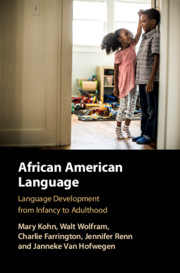Book contents
- African American Language
- African American Language
- Copyright page
- Contents
- Figures
- Tables
- Preface
- Abbreviations
- 1 Coming of Age in African American Language
- 2 The Analysis of Sociolinguistic Change over the Lifespan
- 3 Profiles of Change
- 4 Vowel Variation across Time and Space
- 5 Caretaker’s Influence on Vernacularity
- 6 The Influence of Peers on the Use of African American Language
- 7 Stylistic Variation in the Early AAL Lifespan
- 8 The Relationship of African American Language and Early Literacy Skills
- 9 A Longitudinal Study in Retrospect
- Appendix AAL Feature Code Key
- Index
- References
3 - Profiles of Change
The Early Lifespan of African American Language
Published online by Cambridge University Press: 24 November 2020
- African American Language
- African American Language
- Copyright page
- Contents
- Figures
- Tables
- Preface
- Abbreviations
- 1 Coming of Age in African American Language
- 2 The Analysis of Sociolinguistic Change over the Lifespan
- 3 Profiles of Change
- 4 Vowel Variation across Time and Space
- 5 Caretaker’s Influence on Vernacularity
- 6 The Influence of Peers on the Use of African American Language
- 7 Stylistic Variation in the Early AAL Lifespan
- 8 The Relationship of African American Language and Early Literacy Skills
- 9 A Longitudinal Study in Retrospect
- Appendix AAL Feature Code Key
- Index
- References
Summary
In this chapter, we consider trajectories of change in vernacular African American Language (AAL) based on a set of seven temporal data points, from 48 months of age to post-secondary (19-21 years of age), using a Dialect Density Measure (DDM). Although different trajectories are uncovered, the predominant pattern is the “roller-coaster effect,” in which children’s vernacular index entering school recedes over the first four grades, accelerates during sixth to eighth grade, then recedes again as they proceed through secondary and post-secondary school. Comparison of token-based and type-based inventories show a high correlation in the results, and most individual variables also follow this pattern. However, some variables that are acquired during the later acquisition phase, such as ‘habitual be’ and copula/auxiliary absence, may show divergent patterns over the early lifespan.
Keywords
- Type
- Chapter
- Information
- African American LanguageLanguage development from Infancy to Adulthood, pp. 46 - 72Publisher: Cambridge University PressPrint publication year: 2020

